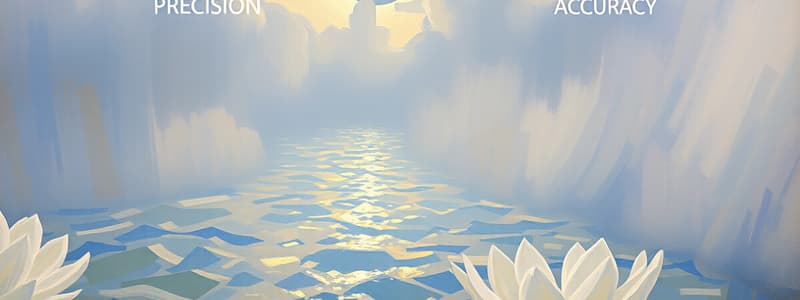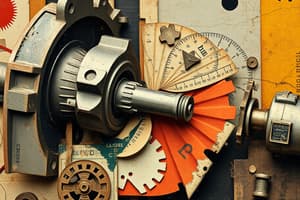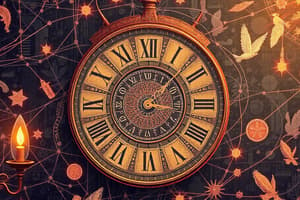Podcast
Questions and Answers
What is the difference between precision and accuracy?
What is the difference between precision and accuracy?
- Precision is a degree of exactness using significant digits. (correct)
- Precision is agreement to known standard. (correct)
- Accuracy is the mass of an object.
- Accuracy is the degree of exactness using significant digits.
Why is the traditional definition of physical science no longer sufficient?
Why is the traditional definition of physical science no longer sufficient?
Physical science does not mean the study of 'dead things'. It studies matter, mass, energy, etc.
Why could the observation that the sun sets in the west be called a scientific law?
Why could the observation that the sun sets in the west be called a scientific law?
Laws describe consistent observations.
Why could the statement 'The rotation of Earth causes the sun to set' be considered a scientific theory?
Why could the statement 'The rotation of Earth causes the sun to set' be considered a scientific theory?
What is mass and how does it differ from weight?
What is mass and how does it differ from weight?
Why would you use scientific notation to express 35 nm in meters?
Why would you use scientific notation to express 35 nm in meters?
Is the mass measured by the zoologist for the elephant accurate?
Is the mass measured by the zoologist for the elephant accurate?
Which branch of science is not included in physical science?
Which branch of science is not included in physical science?
Which science deals most with energy and forces?
Which science deals most with energy and forces?
Using superconductors to build computers is an example of?
Using superconductors to build computers is an example of?
What is a balance used to measure?
What is a balance used to measure?
Which unit is an SI base unit?
Which unit is an SI base unit?
The composition of the mixture of gases that makes up our air is best represented on what kind of graph?
The composition of the mixture of gases that makes up our air is best represented on what kind of graph?
In a controlled experiment, what remains fixed?
In a controlled experiment, what remains fixed?
What is 0.000060 s written in scientific notation?
What is 0.000060 s written in scientific notation?
Why might a chemist make a model of a molecule?
Why might a chemist make a model of a molecule?
What is the maximum depth of a certain lake in kilometers if it is 244 m deep?
What is the maximum depth of a certain lake in kilometers if it is 244 m deep?
Do scientific laws ever change?
Do scientific laws ever change?
Are scientific methods sets of procedures that scientists follow?
Are scientific methods sets of procedures that scientists follow?
Which variable is the dependent variable and which is the independent variable?
Which variable is the dependent variable and which is the independent variable?
Why was data presented in a line graph?
Why was data presented in a line graph?
Where does the step of searching through scientific journals take place in scientific methods?
Where does the step of searching through scientific journals take place in scientific methods?
What is wrong with the statement about falling due to the law of gravitation?
What is wrong with the statement about falling due to the law of gravitation?
How does your stopwatch affect the accuracy and precision of measurement if it runs 2 s fast?
How does your stopwatch affect the accuracy and precision of measurement if it runs 2 s fast?
Which brand is thought to have the best sound for the price?
Which brand is thought to have the best sound for the price?
Is sound quality truly related to price according to the data?
Is sound quality truly related to price according to the data?
Show the composition of silver solder, which is 40% silver, 40% tin, 14% copper, and 6% zinc, in a pie graph?
Show the composition of silver solder, which is 40% silver, 40% tin, 14% copper, and 6% zinc, in a pie graph?
Write 22,000 mg in scientific notation.
Write 22,000 mg in scientific notation.
Write 0.0000037 kg in scientific notation.
Write 0.0000037 kg in scientific notation.
Write the answers to 37,000,000 A multiplied by 7,100,000 s in scientific notation.
Write the answers to 37,000,000 A multiplied by 7,100,000 s in scientific notation.
Write the answer to 0.000312 m^3 divided by 486 s in scientific notation.
Write the answer to 0.000312 m^3 divided by 486 s in scientific notation.
Flashcards are hidden until you start studying
Study Notes
Precision vs. Accuracy
- Precision refers to the degree of exactness using significant digits.
- Accuracy is the agreement of a measurement with a known standard.
Definition of Physical Science
- Traditional definition described physical science as "the science of the nonliving world."
- Current understanding encompasses the study of matter, mass, energy, and not just nonliving objects.
Scientific Law
- A scientific law describes consistent observations, such as the sun setting in the west.
Scientific Theory
- A scientific theory explains phenomena, such as the Earth's rotation causing the sun to set.
Mass vs. Weight
- Mass is the amount of matter in an object, while weight is the force acting on that mass due to gravity.
Scientific Notation
- Using scientific notation is essential for expressing very small measures like 35 nm, represented as 3.5 x 10^-8 m.
Accuracy in Measurement
- The measured mass of the elephant (3,480 kg) is accurate when compared to its actual mass (3,476 kg).
Branches of Science
- Zoology is a branch of science that is not included in physical science.
Focus of Physics
- Physics is the branch of science that primarily deals with energy and forces.
Application of Technology
- Utilizing superconductors to develop computers represents an application of technology.
Scientific Tool for Measurement
- A balance is a tool used for measuring mass.
SI Base Unit
- The kilogram is recognized as an SI base unit.
Pie Graphs
- The composition of air, like mixtures of gases, is best represented using a pie graph.
Controlled Experiment
- In a controlled experiment, one variable is manipulated while other variables remain constant.
Scientific Notation Conversion
- 0.000060 seconds can be expressed in scientific notation as 6.0 x 10^-5 s.
Molecular Modeling
- Chemists create models of molecules to facilitate visualization and better understanding.
Conversion of Units
- The maximum depth of a lake (244 m) converts to kilometers as 0.244 km.
Evolving Scientific Laws
- Scientific laws can change with the introduction of new information.
Scientific Methods
- Scientific methods are not strictly procedural; they are flexible and adaptable depending on the research.
Variables in Experiments
- In experiments, time is considered the independent variable while temperature is the dependent variable.
Line Graph Utilization
- Line graphs are used to represent continuous data effectively.
Research in Scientific Methods
- Before conducting experiments, reviewing scientific journals is part of the research phase in scientific methods.
Misinterpretation of Scientific Laws
- Laws alone do not provide explanations; gravity as a law does not explain the cause of falling objects.
Impact of Stopwatch on Measurements
- A stopwatch running fast affects the accuracy of measurements, making reported times inaccurate.
Sound Quality and Price
- Personal opinion on sound quality preference and data does not support a direct correlation between sound quality and price.
Composition Representation
- The composition of silver solder can be visually represented in a pie graph.
Measurements in Scientific Notation
- 22,000 mg converts to scientific notation as 2.2 x 10^4 mg.
- 0.0000037 kg converts to scientific notation as 3.7 x 10^-6 kg.
Calculations in Scientific Notation
- Multiplying 37 million A by 7.1 million s results in 2.6 x 10^4 A*S.
- Dividing 0.000312 m^3 by 486 s yields 6.42 x 10^7 m^3/s.
Studying That Suits You
Use AI to generate personalized quizzes and flashcards to suit your learning preferences.





